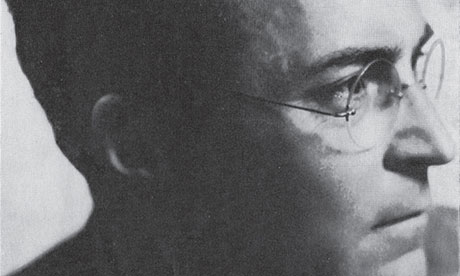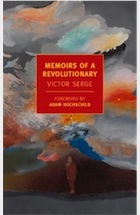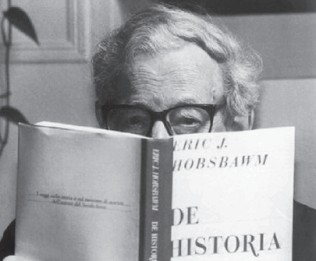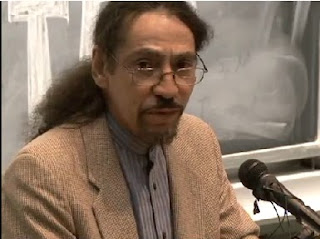Memoirs of a Revolutionary by Victor Serge – review
A new edition of Victor Serge's life story gives Sheila Fitzpatrick fresh reasons to be moved

Victor Serge. Courtesy of the Victor Serge Foundation
When you read a biography of Trotsky, you may feel you have encountered the ultimate in tragic revolutionary lives. Not so: Victor Serge's life is worse. Starting from an immensely deprived childhood, it proceeds to a brief heyday of optimistic identification with the Russian revolution and work in the Comintern, followed by decades of persecution, first in the Soviet Union, as an Oppositionist in Leningrad, and then a deportee in Orenburg, and finally outside it. Even the Trotskyites made him an outcast, although Serge retained an admiration for the Old Man, and died, like him (though not by an assassin's hand), in exile in Mexico.
This is a republication of the 1963 Oxford University Press edition prepared and translated by Peter Sedgwick from Serge's original French text, and the new edition retains Sedgwick's introduction, along with a post-Soviet essay on Serge by Adam Hochschild, a usefully expanded glossary of short biographies, and a number of charming and accomplished pencil sketches of Serge and his friends by his artist son, Vladimir. Vlady, who survived the travails of Europe and ended up with his father in Mexico, also contributes a moving paragraph on Serge's death (by heart attack in Mexico City in 1947 at the age of 57).
Serge's story is often remembered for the vivid portraits of contemporaries dotted throughout the text – revolutionary leaders such as Lenin, Trotsky and Zinoviev, all of whom he knew well, Comintern figures such as Angelica Balabanova and Georg Lukács, the American anarchists Emma Goldman and Alexander Berkman, French writers such as André Gide and Romain Rolland, and a host of others. Independent non-conformist though he was, Serge knew everyone who was anyone on the European revolutionary and left-intellectual scene in the 1920s. Even awaiting rescue in Spain with other French refugees in 1941, he found himself in the company of Walter Benjamin and shared a villa with Varian Fry (anti-Nazi journalist and director of the American Relief Committee) and the surrealist writer André Breton.
A child of itinerant and impoverished Russian revolutionaries, Serge was born in Belgium in 1890 and spent his adolescence in Paris, doing various manual jobs and consorting with other angry and despairing youths in a "world without possible escape", as Serge characterises Europe on the eve of the first world war. Interned as a foreign revolutionary during the war, Serge was plucked from a French concentration camp in 1919 and sent to Russia – where he had never been – under an exchange negotiated by the new Soviet regime. Though inclined to anarchism and independent judgment, Serge joined the Bolsheviks, becoming close to a number of the leaders, as well as the writer Maxim Gorky, and stayed in the party despite his anguish at the suppression of the Kronstadt rising at the end of 1920. Stalin was never one of Serge's intimates, though he makes a brief early appearance "trying to catch Zinoviev's attention" at a Comintern meeting – "frightening and banal, like a Caucasian dagger", in Serge's memorable phrase.
Inevitably, Serge found himself in Trotsky's Left Opposition faction after Lenin's death, though he was never a true disciple of Trotsky or of any other Opposition leader. Persistence in the use of terror and lack of respect for individual freedom were Serge's basic objections to the Soviet regime, and he did not exempt Trotsky, Zinoviev or Lenin from that criticism. Under Stalin, he experienced Bolshevik terror at first hand, along with other Oppositionists, until an international campaign mounted by influential French literary friends in the mid-1930s rescued him from internal exile and enabled him to leave the Soviet Union.
For all his criticisms, Serge deeply admired the first generation of Bolshevik leaders. This is clearer in the new edition than it was in the old one, which failed to include several such statements. This, no doubt, was largely the result of pressure on Sedgwick from the publisher to reduce his text by an eighth, which he generally did at the expense of redundancy, digression or internal contradiction. The trouble is that Serge's praise for the Bolsheviks is often embedded in a digression or implicitly contradicts other statements: it was an issue on which he was obviously in two minds. Thus, one of Sedgwick's omissions (restored in the new edition, though the editors unfortunately do not flag these passages) is Serge's expression of perplexity about a question that he seems to have answered quite confidently elsewhere in the manuscript as a product of intolerance, mistrust of democracy, and a willingness to solve problems by administrative force: "I still ask myself, having closely observed the probity and intelligence of [the party's] leaders, why it didn't [respect individual liberties]. What psychoses of fear and power prevented it?" Similarly, Serge's clear analysis of the Bolshevik "mistakes" of the civil war period turns out to have been partially subverted in the original text by a ringing assertion of loyalty: "I would support the Bolsheviks because they were doing what was necessary tenaciously, doggedly, with magnificent ardour and a calculated passion; I would be with them because they alone were carrying this out, taking all responsibilities on themselves, all the initiatives, and were demonstrating an astonishing strength of spirit."
When I first read these memoirs, as a young would-be Soviet historian at the time of their first publication in English, the paragraph that struck me most poignantly and remained imprinted was Serge's confession that "the feeling of having so many dead men at my back, many of them my betters in energy, talent, and historical character, has often overwhelmed me, and that this feeling has been for me the source of a certain courage, if that is the right word for it." This remains one of the great lines in the annals of revolutionary memoir. On rereading, however, I found myself equally moved by Serge's rueful meditations on the uses of human reason. "Many times," he writes, "I have felt myself on the brink of a pessimistic conclusion as to the function of thinking, of intelligence, in society", even to the point of wondering whether "the role of critical intelligence", which he had exercised so often and at such costs to himself, might not be "dangerous, and very nearly useless". He banishes such thoughts rather lamely with the remark that societies need critical thinking and "better times will come" – but then adds, with more conviction, that in any case, the use of the critical faculty is "a source of immense satisfactions" to the thinker. Perhaps, after all, we can regard the life of Victor Serge, perennial critic and dissenter, as, in a certain sense, a happy one.
Tear Off the Masks! Identity and Imposture in Twentieth-Century Russia by Sheila Fitzpatrick is published by Princeton.
- Memoirs of a Revolutionary
- by Victor Serge, translated by Peter Sedgwick and George Paizis

- Buy it from the Guardian bookshop
- Tell us what you think: Star-rate and review this book
Serge's story is often remembered for the vivid portraits of contemporaries dotted throughout the text – revolutionary leaders such as Lenin, Trotsky and Zinoviev, all of whom he knew well, Comintern figures such as Angelica Balabanova and Georg Lukács, the American anarchists Emma Goldman and Alexander Berkman, French writers such as André Gide and Romain Rolland, and a host of others. Independent non-conformist though he was, Serge knew everyone who was anyone on the European revolutionary and left-intellectual scene in the 1920s. Even awaiting rescue in Spain with other French refugees in 1941, he found himself in the company of Walter Benjamin and shared a villa with Varian Fry (anti-Nazi journalist and director of the American Relief Committee) and the surrealist writer André Breton.
A child of itinerant and impoverished Russian revolutionaries, Serge was born in Belgium in 1890 and spent his adolescence in Paris, doing various manual jobs and consorting with other angry and despairing youths in a "world without possible escape", as Serge characterises Europe on the eve of the first world war. Interned as a foreign revolutionary during the war, Serge was plucked from a French concentration camp in 1919 and sent to Russia – where he had never been – under an exchange negotiated by the new Soviet regime. Though inclined to anarchism and independent judgment, Serge joined the Bolsheviks, becoming close to a number of the leaders, as well as the writer Maxim Gorky, and stayed in the party despite his anguish at the suppression of the Kronstadt rising at the end of 1920. Stalin was never one of Serge's intimates, though he makes a brief early appearance "trying to catch Zinoviev's attention" at a Comintern meeting – "frightening and banal, like a Caucasian dagger", in Serge's memorable phrase.
Inevitably, Serge found himself in Trotsky's Left Opposition faction after Lenin's death, though he was never a true disciple of Trotsky or of any other Opposition leader. Persistence in the use of terror and lack of respect for individual freedom were Serge's basic objections to the Soviet regime, and he did not exempt Trotsky, Zinoviev or Lenin from that criticism. Under Stalin, he experienced Bolshevik terror at first hand, along with other Oppositionists, until an international campaign mounted by influential French literary friends in the mid-1930s rescued him from internal exile and enabled him to leave the Soviet Union.
For all his criticisms, Serge deeply admired the first generation of Bolshevik leaders. This is clearer in the new edition than it was in the old one, which failed to include several such statements. This, no doubt, was largely the result of pressure on Sedgwick from the publisher to reduce his text by an eighth, which he generally did at the expense of redundancy, digression or internal contradiction. The trouble is that Serge's praise for the Bolsheviks is often embedded in a digression or implicitly contradicts other statements: it was an issue on which he was obviously in two minds. Thus, one of Sedgwick's omissions (restored in the new edition, though the editors unfortunately do not flag these passages) is Serge's expression of perplexity about a question that he seems to have answered quite confidently elsewhere in the manuscript as a product of intolerance, mistrust of democracy, and a willingness to solve problems by administrative force: "I still ask myself, having closely observed the probity and intelligence of [the party's] leaders, why it didn't [respect individual liberties]. What psychoses of fear and power prevented it?" Similarly, Serge's clear analysis of the Bolshevik "mistakes" of the civil war period turns out to have been partially subverted in the original text by a ringing assertion of loyalty: "I would support the Bolsheviks because they were doing what was necessary tenaciously, doggedly, with magnificent ardour and a calculated passion; I would be with them because they alone were carrying this out, taking all responsibilities on themselves, all the initiatives, and were demonstrating an astonishing strength of spirit."
When I first read these memoirs, as a young would-be Soviet historian at the time of their first publication in English, the paragraph that struck me most poignantly and remained imprinted was Serge's confession that "the feeling of having so many dead men at my back, many of them my betters in energy, talent, and historical character, has often overwhelmed me, and that this feeling has been for me the source of a certain courage, if that is the right word for it." This remains one of the great lines in the annals of revolutionary memoir. On rereading, however, I found myself equally moved by Serge's rueful meditations on the uses of human reason. "Many times," he writes, "I have felt myself on the brink of a pessimistic conclusion as to the function of thinking, of intelligence, in society", even to the point of wondering whether "the role of critical intelligence", which he had exercised so often and at such costs to himself, might not be "dangerous, and very nearly useless". He banishes such thoughts rather lamely with the remark that societies need critical thinking and "better times will come" – but then adds, with more conviction, that in any case, the use of the critical faculty is "a source of immense satisfactions" to the thinker. Perhaps, after all, we can regard the life of Victor Serge, perennial critic and dissenter, as, in a certain sense, a happy one.
Tear Off the Masks! Identity and Imposture in Twentieth-Century Russia by Sheila Fitzpatrick is published by Princeton.






0 Comments: